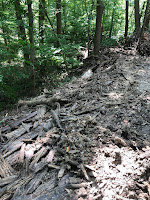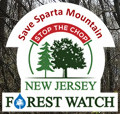Have you heard about the current logging underway at Roaring Rock Park, the beautiful, 400-acre wooded preserve in Washington Township, Warren County, NJ? Much has been said lately about severe environmental damage that would result if the Township’s “Forest Management Plan” (FMP) is enacted. Without stakeholder input, residents and environmental groups only recently heard about the FMP, although the project had been in development by the Township for at least five years. I initially thought it might be an opportunity to improve this woodlot. As a former Assistant Director of the NJDEP Division of Parks & Forestry and an experienced and nationally-certified parks & recreation professional serving as land manager and agency head on municipal, county and state levels for 42 years, however, I found this FMP sorely lacking.
NJ Highlands Coalition representatives and I advised the Township to limit their logging to winter months to minimize erosion and soil compaction when the soil is frozen and the vegetation is dormant. They said they would reassess the situation and wouldn’t proceed without further study. We recommended the following FMP amendments:
- Develop a forest restoration plan to replicate the existing eastern deciduous forest ecosystem.
- Develop a strategy for addressing invasive plant species, which spread to fill in the holes after the trees fall.
- Develop a deer management plan, as deer will decimate any native seedlings that manage to grow in those opened areas.
A robust, fully funded restoration plan that includes invasive plant and deer management is absent from the FMP.
With experience operating deer management programs, I offered to assist the Township in developing a no-cost and effective deer management plan. In addition, highly qualified experts from the NJ Highlands Coalition had offered to conduct - also at no charge - surveys of rare plants and wildlife species of special concern.
We warned the Township that 10’ wide corridors would have to be cleared to accommodate the “skid steer” machinery used to drag out heavy tree trunks. The weight of the machinery and trees would compact the root systems of the flanking tress, and eventually cause their death. We reminded them that Brass Castle Creek is a Category 1 stream, worthy of the standard DEP 300’ activity-free buffer. It’s also one of only 36 exceptional waterways statewide designated with special regulations as Wild Trout Streams by the DEP Division of Fish & Wildlife, who rated Brass Castle Creek as “excellent” and “optimal” to support the habitat of sensitive species like Brook Trout and Northern Two-lined Salamander, after inspections conducted in 2016 and 2018.
I was shocked to see “Phase I” logging begin on June 21st, the worst possible time of the year because spring and early summer is songbird nesting season. Trees with dozens, if not, hundreds of nests were toppled. It’s also when amphibians, reptiles and sensitive aquatic species emerge. Now, conditions due to logging are horrendous. Multiple haul roads were cut, but no remediation was done to restore muddy road conditions. With heavy summer rain events, mud and silt will run unchecked into Brass Castle Creek. The logger seems to care only about taking marketable logs off site, as all of the tree crowns are piled deeply on site, crushing forest floor habitat. Those piles of drying branches and leaves will add to the forest floor fuel load, compounding the risk of wildfire.
The evidence of critical destruction is apparent on the forest floor. My question to the Washington Township Committee, and indeed, the public who elected them is will you allow this tragedy to continue, or will you do the right thing by promoting reforestation and stopping further logging? What will it be?
John G. Trontis, CPRP
Certified Professional Recreation and Parks
Before his retirement, Trontis was the Assistant Director of the New Jersey DEP Division of Parks and Forestry. Prior to that role, he was Director of Parks and Recreation for Hunterdon County. Despite being a retired full time public servant, he keeps himself busy as a Trustee of the Warren County Parks Foundation and a District Firewarden for the NJ Forest Fire Service. He currently resides in Washington Township, Warren County, New Jersey.
BE ADVISED: The NJDEP neither endorses nor opposes the views expressed in this article or the activities of saveroaringrockpark.org in this matter.





